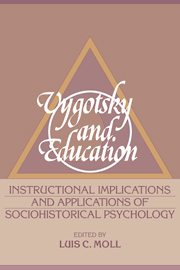Book contents
- Frontmatter
- Contents
- List of contributors
- Preface
- Acknowledgments
- Introduction
- Part I Historical and theoretical issues
- 1 Vygotsky: The man and his cause
- 2 The historical context of Vygotsky's work: A sociohistorical approach
- 3 Cognitive development and formal schooling: The evidence from cross-cultural research
- 4 The voice of rationality in a sociocultural approach to mind
- 5 The social origins of self-regulation
- 6 Vygotsky, the zone of proximal development, and peer collaboration: Implications for classroom practice
- Part II Educational implications
- Part III Instructional applications
- Name index
- Subject index
4 - The voice of rationality in a sociocultural approach to mind
Published online by Cambridge University Press: 05 June 2012
- Frontmatter
- Contents
- List of contributors
- Preface
- Acknowledgments
- Introduction
- Part I Historical and theoretical issues
- 1 Vygotsky: The man and his cause
- 2 The historical context of Vygotsky's work: A sociohistorical approach
- 3 Cognitive development and formal schooling: The evidence from cross-cultural research
- 4 The voice of rationality in a sociocultural approach to mind
- 5 The social origins of self-regulation
- 6 Vygotsky, the zone of proximal development, and peer collaboration: Implications for classroom practice
- Part II Educational implications
- Part III Instructional applications
- Name index
- Subject index
Summary
Over the past decade there has been a growing tendency among cognitive, developmental, and educational psychologists to view human mental functioning in terms of an aggregate of skills or an aggregate of contextually situated processes. This contrasts with the dominant tendency toward viewing mental functioning as some kind of unified entity, a tendency clearly manifested in notions of general intelligence or in the metaphor of a central processor. Some of the impetus for this change has come from new theoretical orientations such as Leont'ev's (1981) ideas about activity (e.g., LCHC, 1983), but it also stems from a host of other factors such as a general dissatisfaction with standard measures of intelligence (e.g., Gardner, 1983).
Much of this new orientation has grown out of a desire to expand the focus of research beyond the kinds of mental functioning privileged in formal instructional settings. In this connection, whole new areas of inquiry have emerged. For example, the recent emphases on “everyday cognition” (Rogoff & Lave, 1984) and on “cognition in practice” (Lave, 1988) have been motivated by a desire to examine forms of social and psychological functioning that are explicitly contrasted with practices found in formal educational settings.
Although there is clearly a growing tendency to espouse an approach that recognizes various forms of mental functioning, there remains a tendency to view one form of mental functioning as somehow more basic, more “cognitive,” or more important than others.
- Type
- Chapter
- Information
- Vygotsky and EducationInstructional Implications and Applications of Sociohistorical Psychology, pp. 111 - 126Publisher: Cambridge University PressPrint publication year: 1990
- 66
- Cited by



